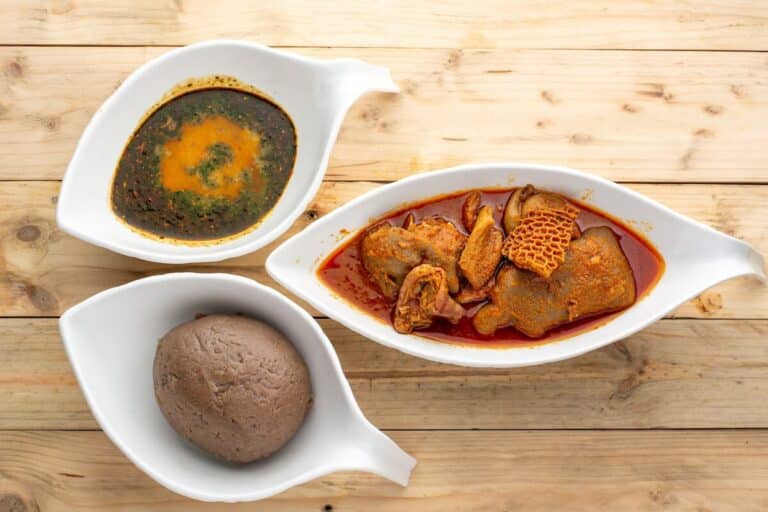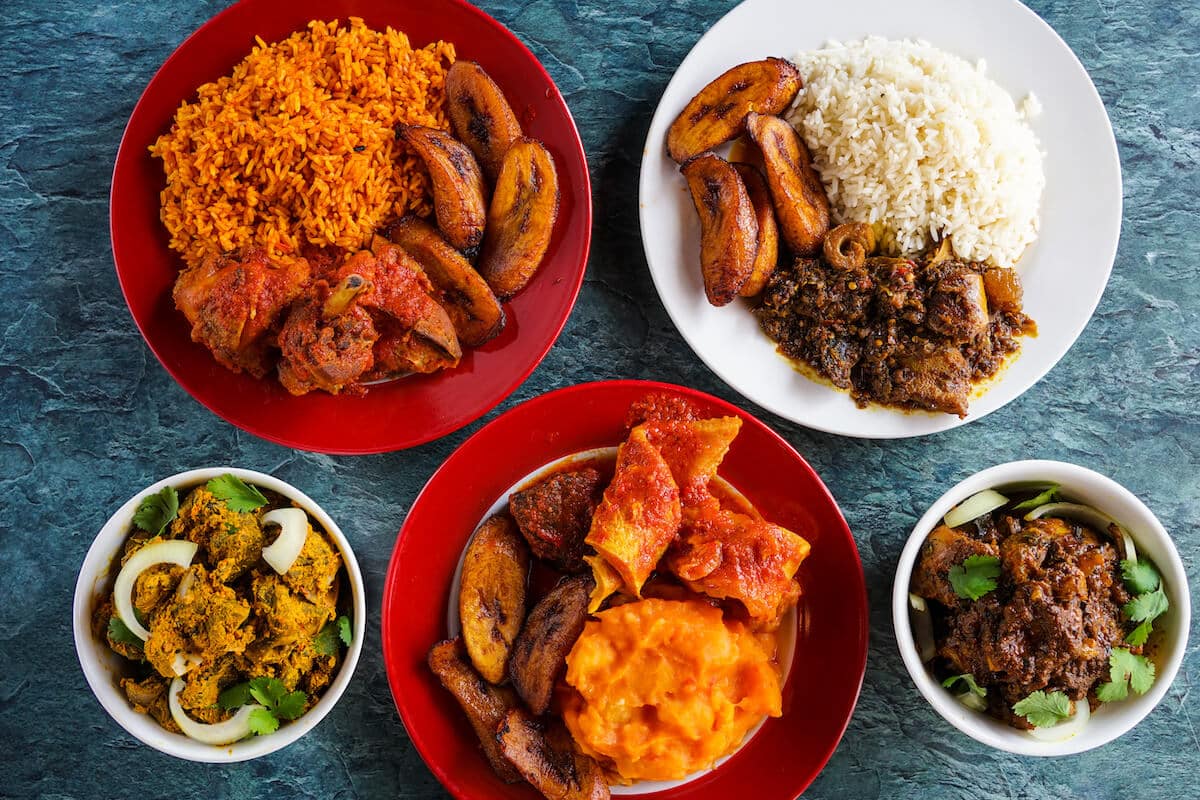
Nigeria, with its rich cultural tapestry, is not just the most populous country in Africa but also home to an incredibly diverse range of dishes. For Nigerians living in Australia or Australians curious about global flavours, Nigerian cuisine offers an exciting journey. Nigerian restaurants and African grocers are introducing these dishes to cities like Sydney and Melbourne. Whether you’re looking to prepare these meals at home or explore local Nigerian restaurants, this Remitly guide has all the classics.
Here’s a quick look at the 21 traditional Nigerian dishes before we jump in to the details:
- Jollof Rice
- Tuwo Shinkafa
- Fufu
- Afang Soup
- Eba
- Efo Riro
- Nkwobi
- Ogbono Soup
- Suya
- Moin Moin
- Fried Plantains (Dodo)
- Egusi Soup
- Ewedu Soup
- Akara (Bean Cakes)
- Pepper Soup
- Ofada Rice and Ayamase
- Ewa Agoyin
- Okro Soup
- Puff Puff
- Chin Chin
- Zobo Drink
Related: Want to explore more West African food? Check out our guides on Ghanaian cuisine and Senegal’s national dish.
1. Jollof rice
This rice dish is actually the national dish of Nigeria. It’s one of the most well-known Nigerian dishes, and it’s often the first food that foreigners associate with Nigerian cuisine.
Jollof rice is made from a base of rice, tomato, and broth that’s cooked down with bell peppers, habaneros (also called scotch bonnet peppers), curry, thyme, and bay leaves. Nigerians typically serve jollof rice as a side dish with chicken and fried plantains. Enjoy a taste of Nigerian food with this simple yet authentic dish, which is bound to show up on the menu at almost any Nigerian restaurant.
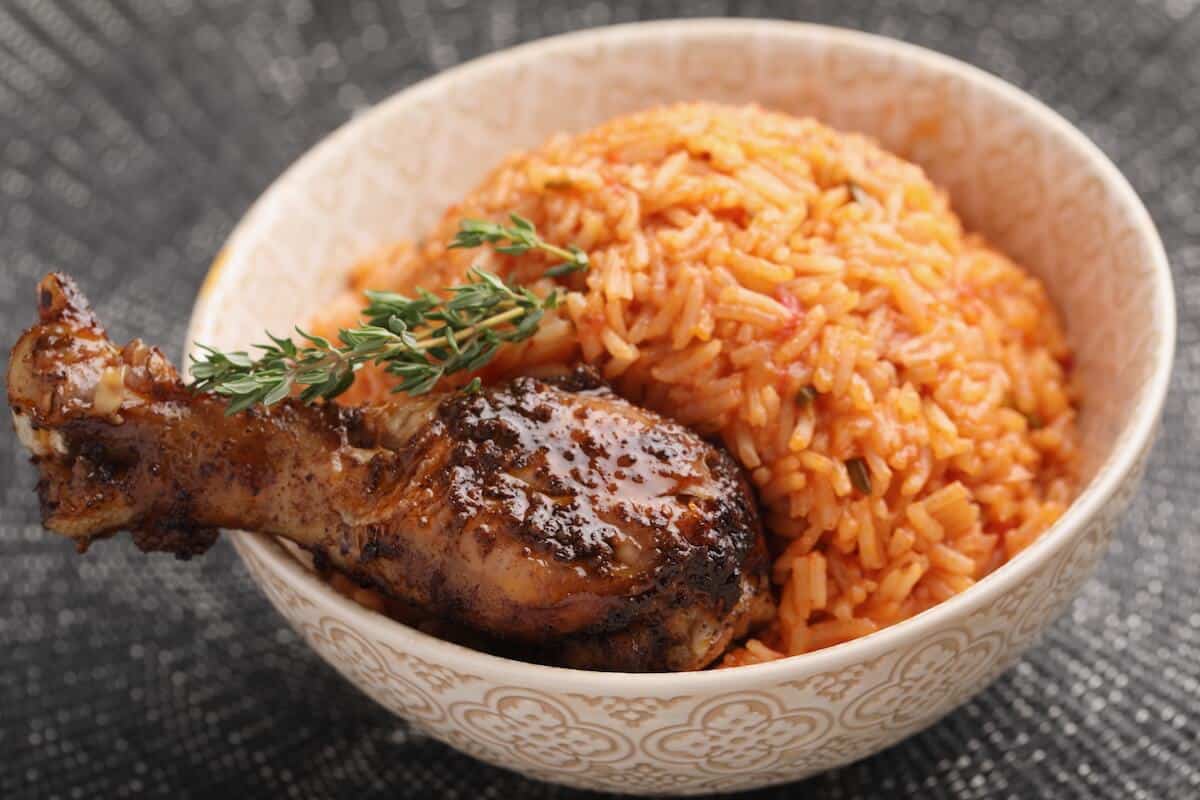
2. Tuwo shinkafa
Tuwo shinkafa is a side dish that’s used to bulk up Nigerian soups or stews. Its name literally translates to “rice meal,” and it is most commonly eaten by people in the northern part of Nigeria.
To make tuwo shinkafa, you cook down rice with water until it forms a glutenous paste. From there, you shape it into a soft, sticky ball and steam it. If you make tuwo shinkafa for dinner tonight, pair it with other Nigerian dishes like banga soup.
You May Also Like: 10 Brazilian Snacks You Can’t Miss
3. Fufu
Fufu is one of the most popular Nigerian dishes because it’s a hearty, filling addition to any meal.
Fufu is a starch ball that you make by boiling plants like rice, cassava, or plantains. You grind the starches into a paste, form them, and then boil them to make fufu. For those who aren’t familiar, the texture is somewhere between bread dough and mashed potatoes.
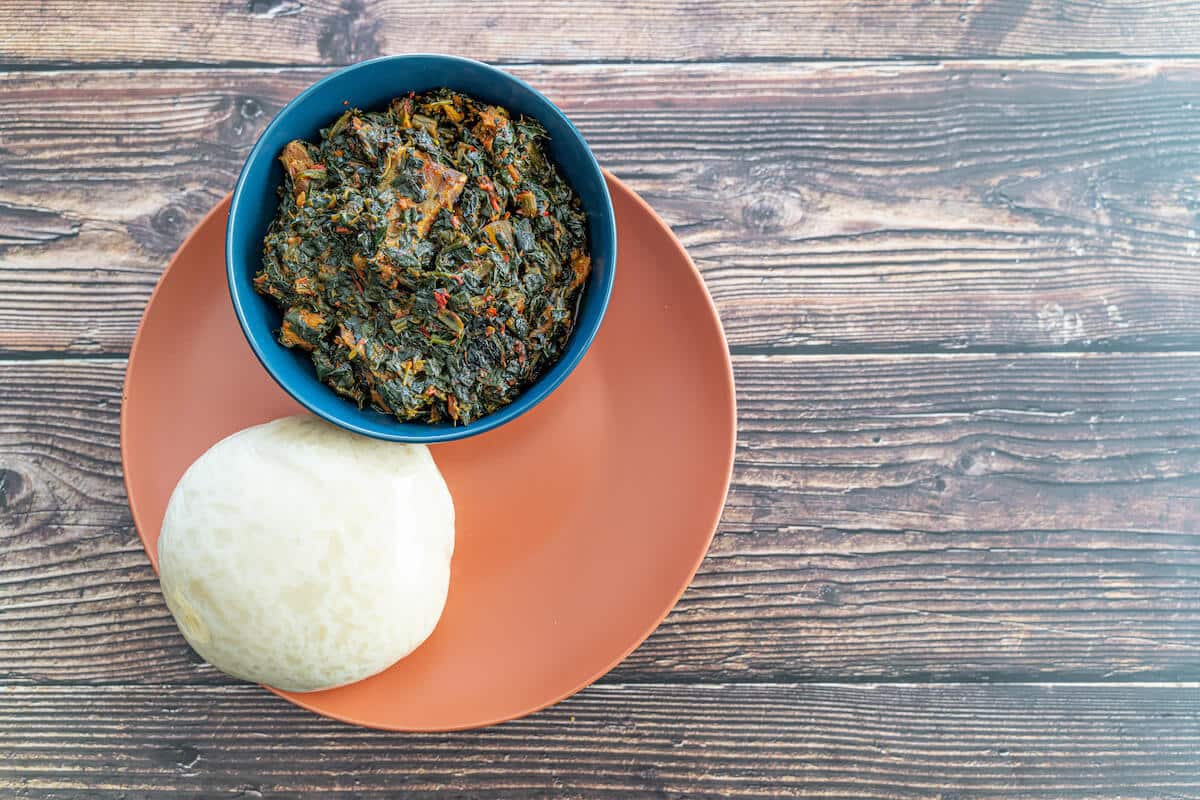
4. Afang soup
Afang is a soup made from the leaves of the afang plant, which is a climbing vine native to sub-Saharan Africa. It’s sometimes referred to as “wild spinach” in English. Afang soup differs depending on who’s cooking it, but this vegetable soup typically includes dried fish, crayfish, onions, and palm nut oil.
If you live abroad, it can be difficult to find afang leaves for this dish, but you can sometimes find dried afang in your local African food store.
5. Eba
Similar to fufu, eba is a starch ball that’s often served as a side dish for soup. Also called garri, eba is made from refined cassava flour and water.
Cassava is a popular wheat replacement for people who can’t eat gluten; if you’re interested in this gluten-free Nigerian dish, you can easily make eba at home.
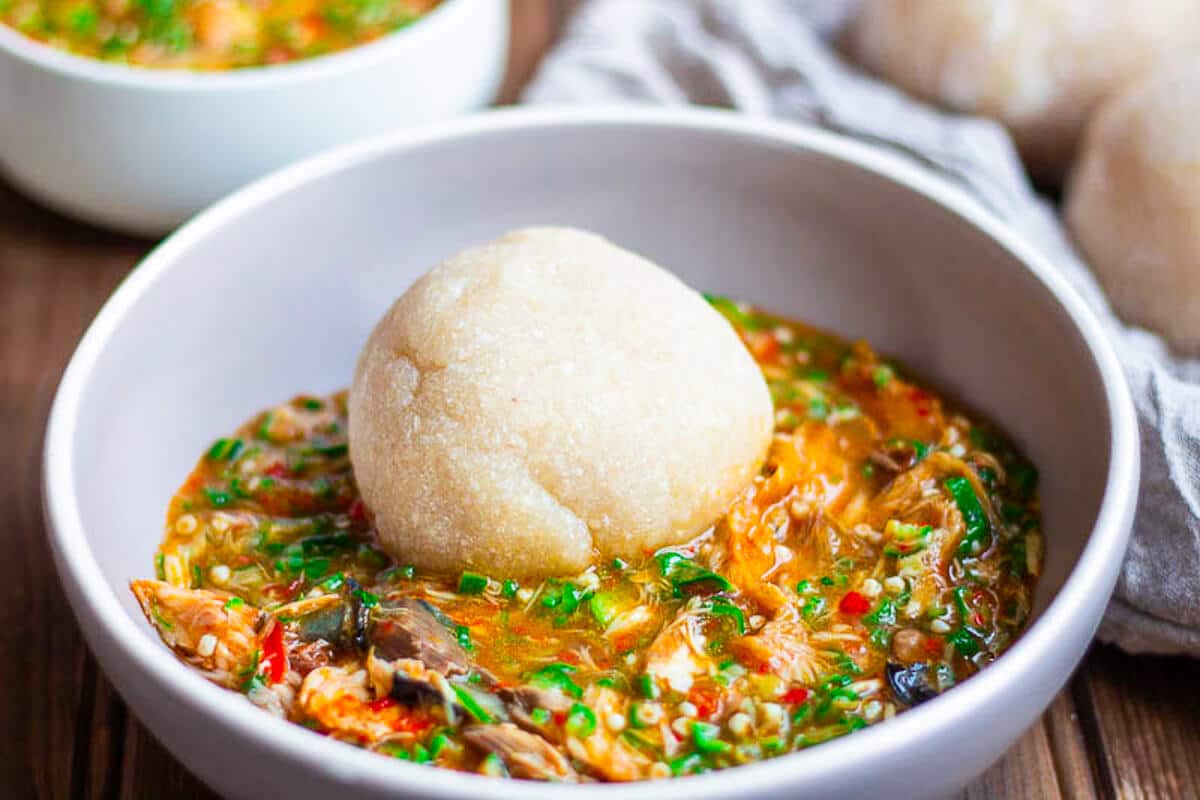
6. Efo riro
Efo riro means “vegetable soup,” which many Nigerian families make as a spinach stew. Originally a traditional Yoruba dish, efo riro often includes pumpkin leaves, tomatoes, onions, and proteins like dry fish or crayfish.
To bulk up the dish, Nigerians often serve efo riro with a side of fufu.
7. Nkwobi
Nkwobi is a spicy meat dish that originated from Nigeria’s Igbo people. Nigerians typically make nkwobi with cow leg, but some people use cow’s feet, goat meat, or wild game, too.
This hearty meat stew makes for delicious street food; it’s not unusual to see Nigerians eating nkwobi over a beer at the bar. It can take a long time to stew nkwobi, but the rich flavor of this Nigerian dish makes the effort worthwhile.
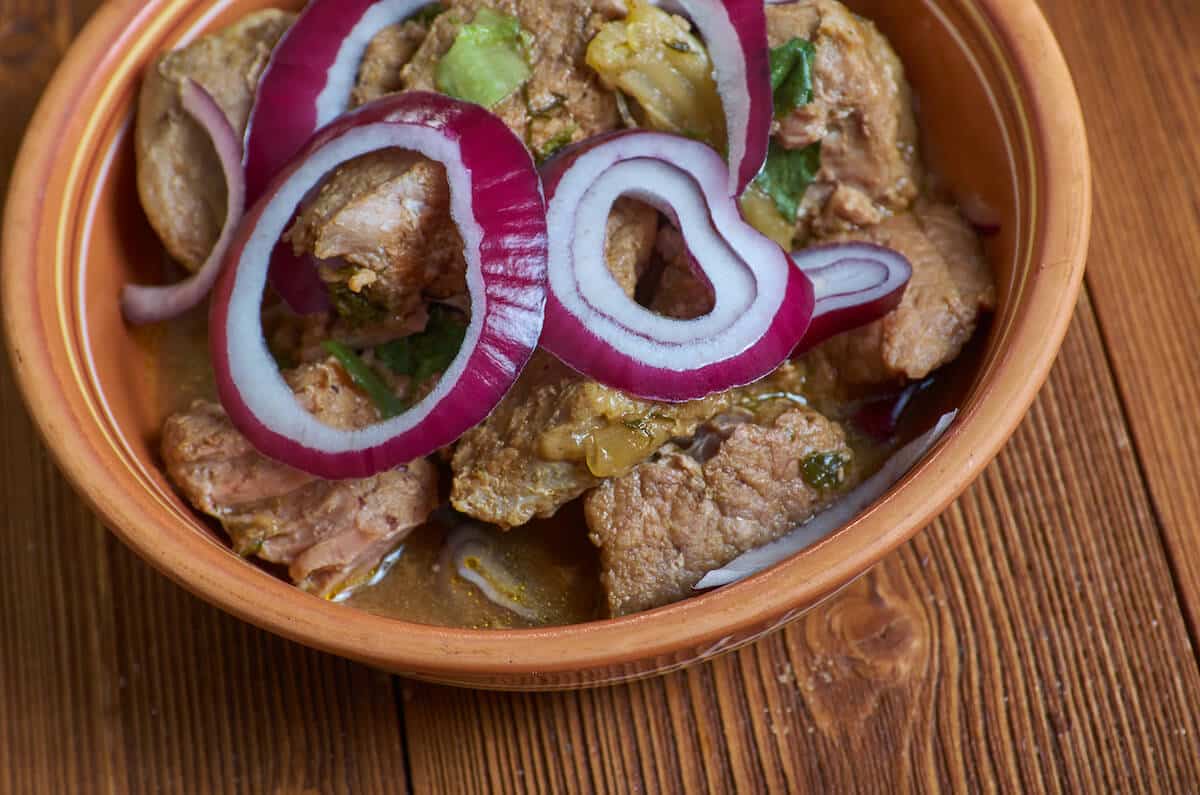
8. Ogbono soup
The main ingredient for ogbono soup is ogbono seeds, which are the seeds of a Nigerian plant known as wild mango or bush mango. This soup is usually made with a variety of leafy vegetables, fish, and palm oil, although the exact recipe will differ by household.
Ogbono seeds are available to purchase online if you don’t have an African foods store near your home.
9. Suya
A recipe from the Hausa people, suya is a savory protein dish. It’s typically made with seasoned beef or chicken that’s grilled on a skewer. “Suya” is the name of the seasoning mix used to coat the meat.
Nigerians often serve suya with a groundnut sauce to round out the dish.
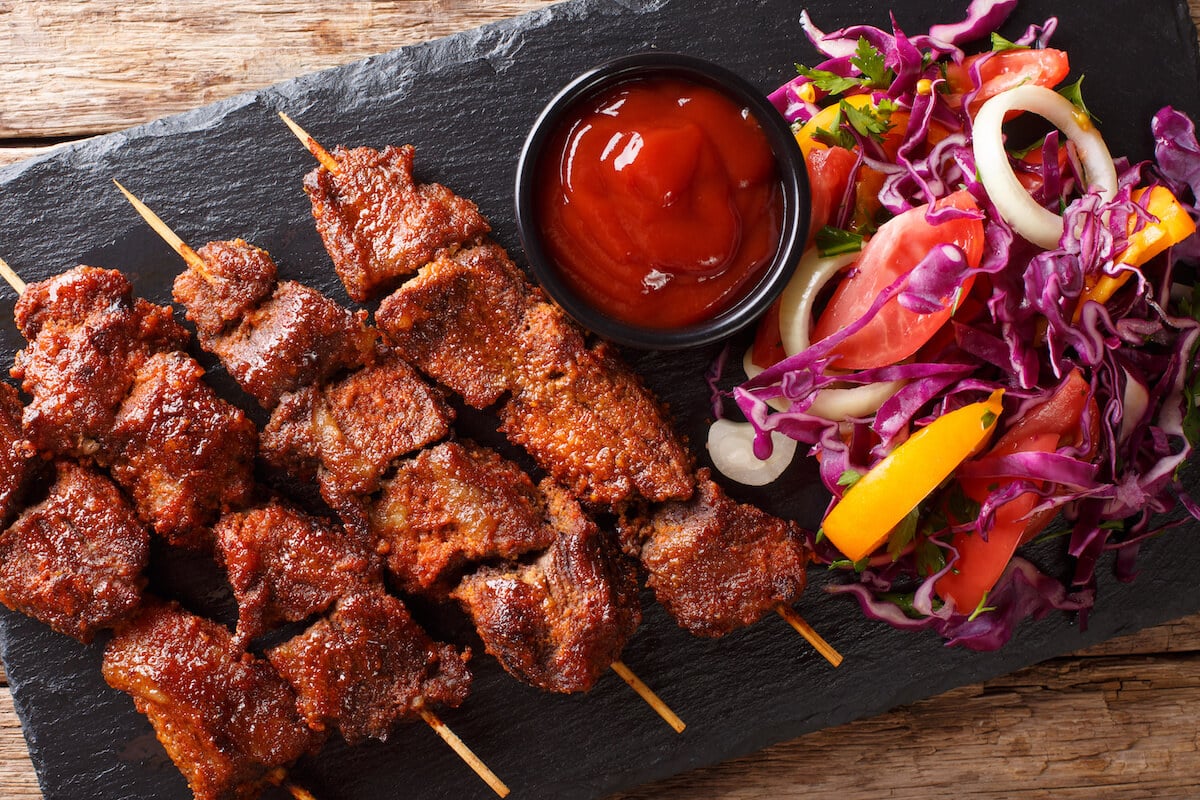
10. Moin moin
This Nigerian dish is also called moi moi or moyi moyi. Moin moin is a savory steamed bean pudding that’s made from a mixture of black-eyed peas, habanero peppers, bell peppers, palm oil, and onions.
You make moin moin by soaking the peas, processing them to remove the skins, seasoning them, and steaming the paste. You can form moin moin either by hand or in a ramekin for easier cleanup.
11. Fried plantains
Also called dodo, sweet fried plantains are a popular side dish and appetizer in Nigerian cuisine. All you need are plantains, frying oil, and salt for seasoning.
Nigerians typically pair fried plantains with a rich dipping sauce, but they’re also a popular side dish for soups and stews. Pick very ripe plantains with dark skin for authentic dodo.
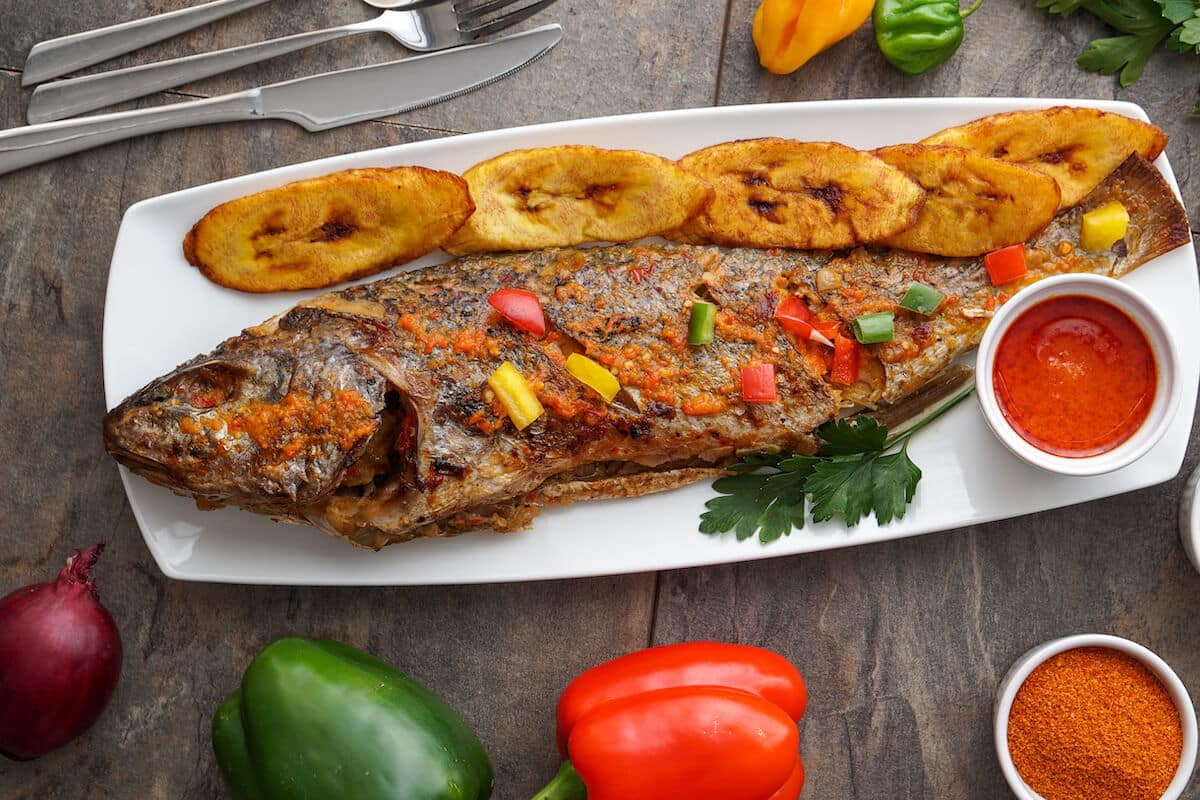
12. Egusi soup
Egusi soup is a one-pot meal that packs in vegetables and protein. The main ingredient is egusi, which is ground or milled melon seeds.
The soup usually includes locust beans, fish, and leafy vegetables like waterleaf, pumpkin leaves, or bitter leaf. Don’t forget to serve your egusi soup with fufu or eba on the side.
13. Ewedu soup
Ewedu soup is a dish that comes from the Yoruba people of Nigeria. This vibrant green soup is made from jute leaves, which give it a thick and slimy mouthfeel, not unlike okra soup.
Ewedu often includes egusi, crayfish, and locust beans. Consider pairing it with amala, which is like fufu, but made from pounded yams.
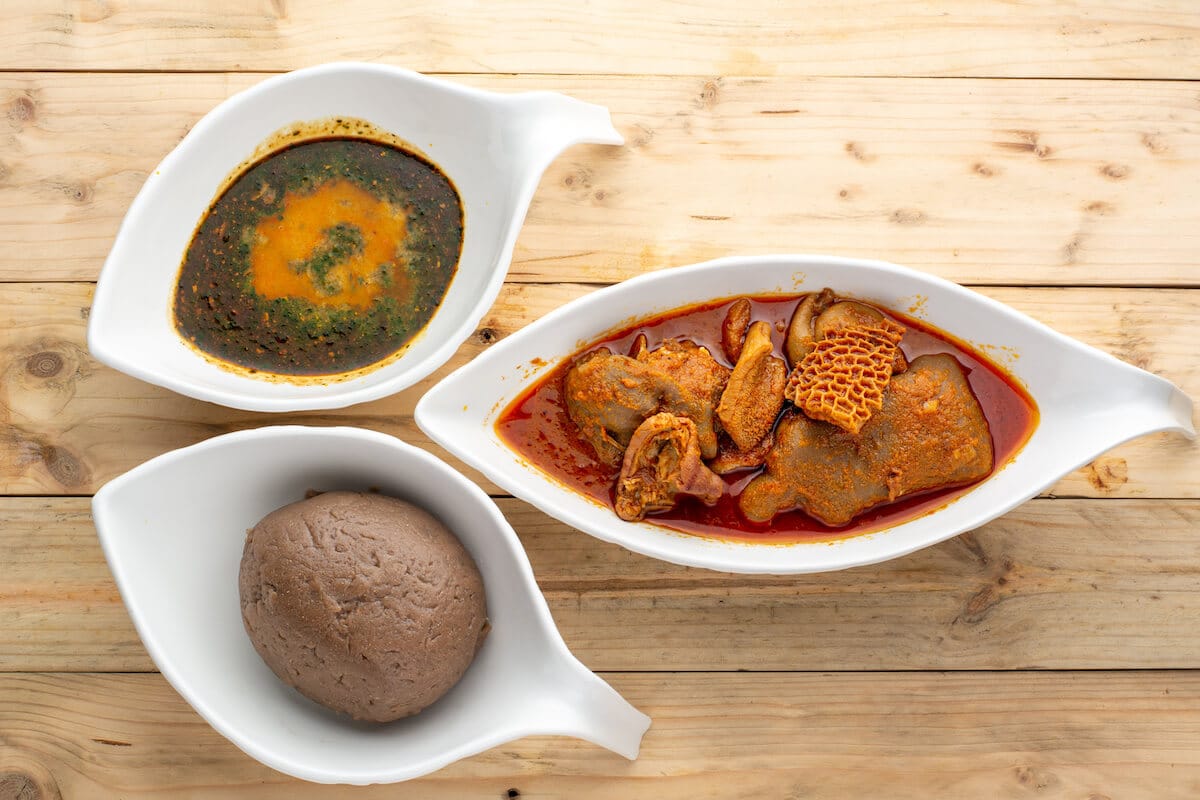
14. Akara (Bean Cakes)
Akara is a dish with deep historical roots, believed to originate from the Yoruba people of southwestern Nigeria. Made from blended black-eyed peas, onions, and spices, akara is deep-fried to create crispy-on-the-outside, soft-on-the-inside fritters. It’s commonly eaten for breakfast, paired with pap or agege bread.
Akara is not just a Nigerian staple but is also enjoyed across West Africa. It’s often sold by street vendors in Lagos, where it has become a favorite among commuters looking for a quick, protein-rich snack.
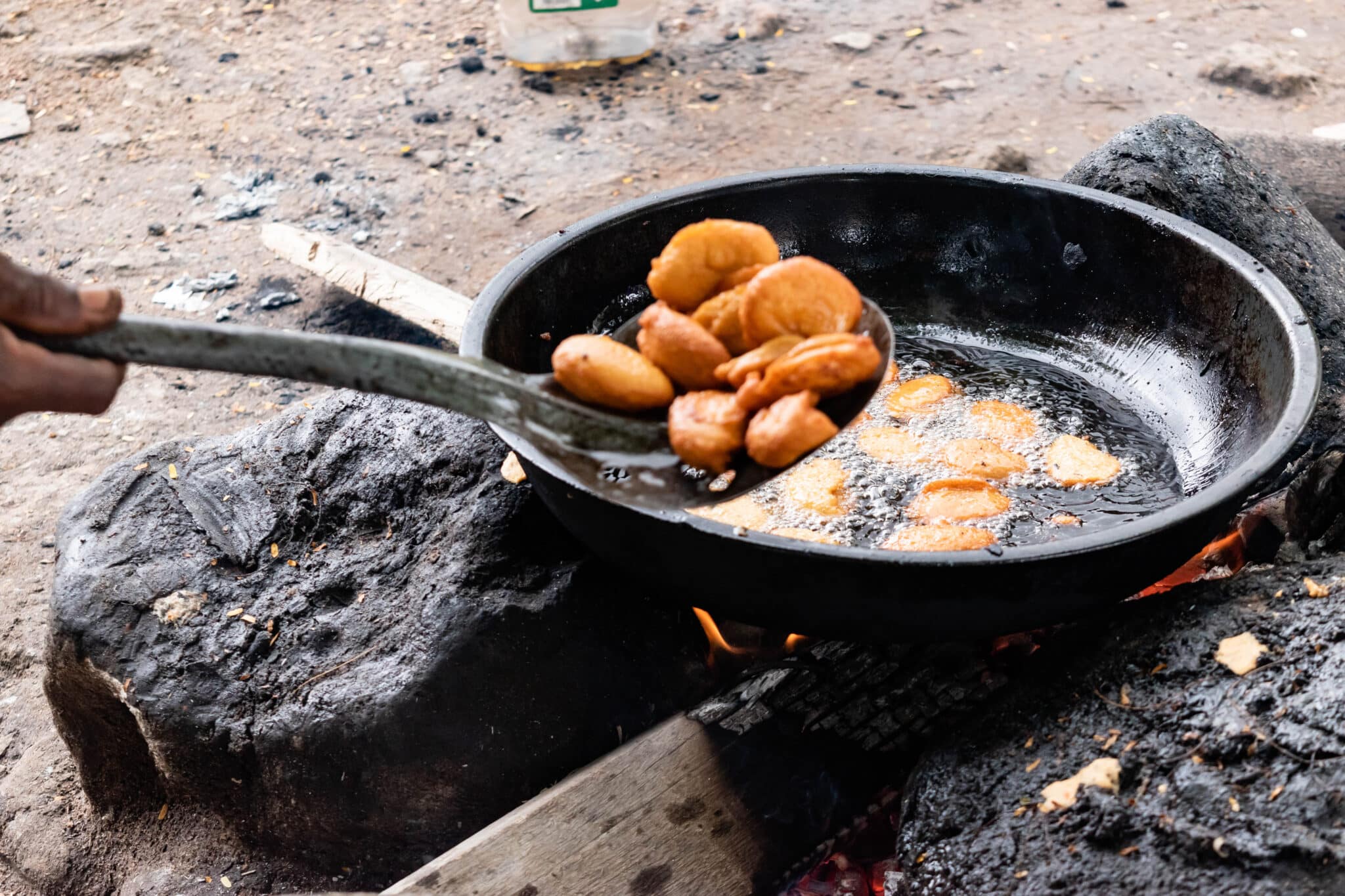
15. Pepper Soup
Pepper soup is one of the oldest dishes in Nigerian cuisine, known for its bold, fiery flavor. The broth is spiced with a blend of native ingredients like uziza seeds, calabash nutmeg, and ata rodo (scotch bonnet peppers). It’s usually prepared with meats like goat, chicken, or fish, and the soup is served piping hot, often as a remedy for colds or simply as comfort food.
Pepper soup is traditionally served at Nigerian gatherings, celebrations, and wakes. Its origins trace back to many ethnic groups in Nigeria, each adding their own twist to the recipe, from the Niger Delta’s fish-based version to the Yoruba’s goat meat variation, as in this version.
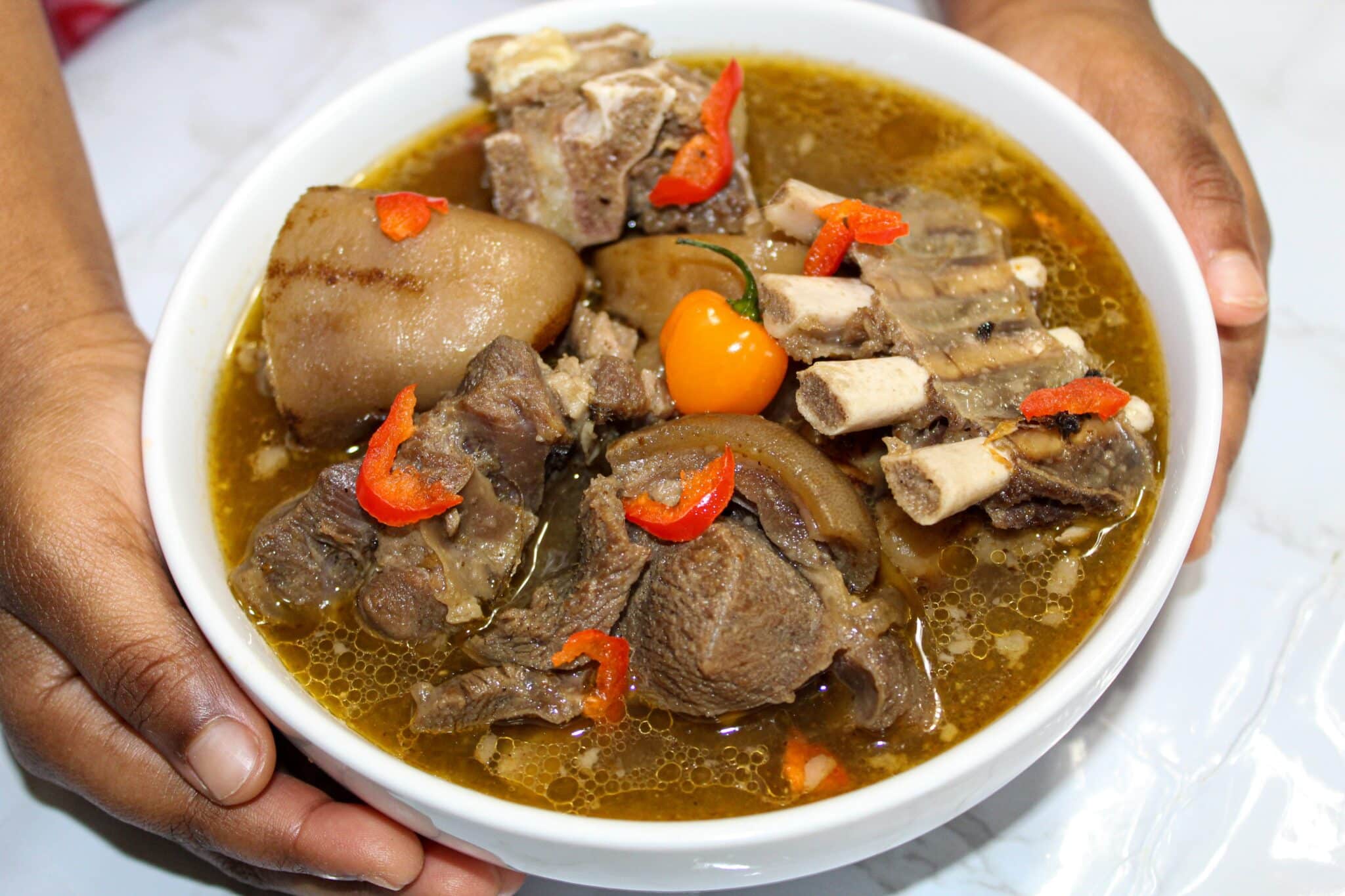
16. Ofada Rice and Ayamase
Ofada rice is a unique, locally grown Nigerian rice known for its unpolished grains and slightly earthy flavor. Unlike long-grain rice, Ofada is short and brownish, giving it a distinct texture and taste. It’s paired with ayamase, a green pepper sauce made with a blend of green bell peppers, scotch bonnets, onions, and locust beans. This dish is particularly popular in the southwestern part of Nigeria, especially in Lagos and Ogun states.
Ayamase, also known as designer stew, is notorious for its heat and flavor. The sauce is often cooked with palm oil, giving it a rich, savory taste, and is typically served with fried or grilled protein like chicken, goat meat, or beef.
17. Ewa Agoyin
Ewa agoyin is a staple street food dish that has its roots in both Nigeria and Togo. Made from boiled, mashed black-eyed peas, this dish is served with a spicy, caramelized sauce that is slow-cooked with dried peppers and onions. The sauce gives ewa agoyin its signature flavor—smoky, spicy, and rich.
Historically, this dish became popular in Lagos through Togolese migrants who settled in Nigeria. Over time, it evolved into a beloved part of Lagos street food culture, especially popular for breakfast.
18. Okro Soup
Okro soup, also known as okra soup, is a dish made from okra, a vegetable native to West Africa and parts Asia that was introduced to the Americas via the transatlantic slave trade. Okra gives the soup its thick and somewhat slimy texture, which is loved by many. The dish typically includes proteins like beef, goat, or fish and leafy greens like spinach or ugu (fluted pumpkin leaves).
Okro soup is a versatile dish that varies in preparation across different regions of Nigeria. It is often served with fufu or eba, making it a hearty and filling meal. Here’s a traditional Okro soup recipe to try at home.
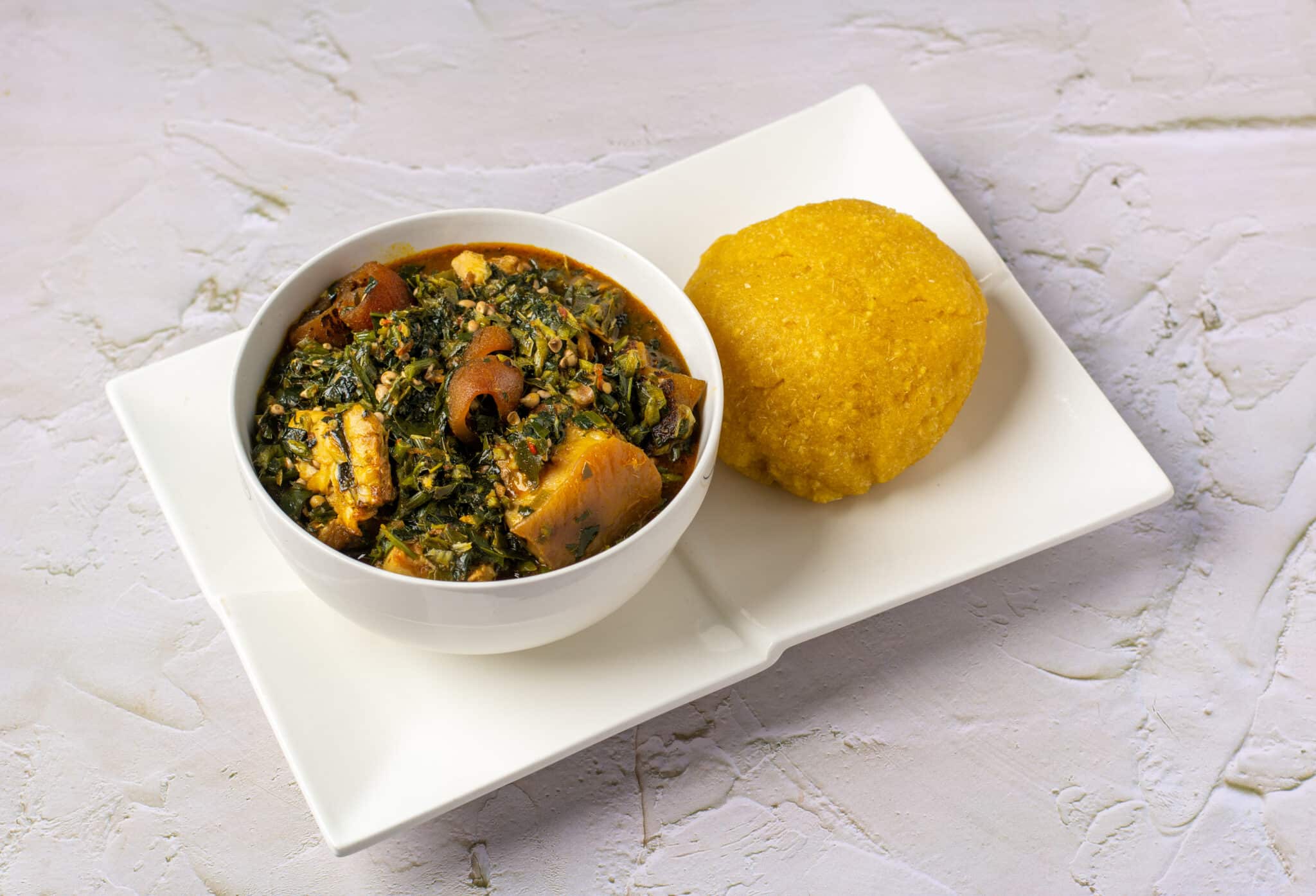
19. Puff Puff
Puff puff is a popular snack in Nigeria, often sold by street vendors. It’s made from a simple batter of flour, sugar, yeast, and water, then deep-fried until golden brown. These sweet, doughy balls are a staple at parties, celebrations, and street markets, making them a beloved snack for Nigerians of all ages.
The recipe for puff puff is versatile and can be adjusted to suit different tastes. Some vendors add a dusting of powdered sugar, while others infuse the batter with nutmeg for extra flavor. For an easy guide, follow this puff puff recipe.
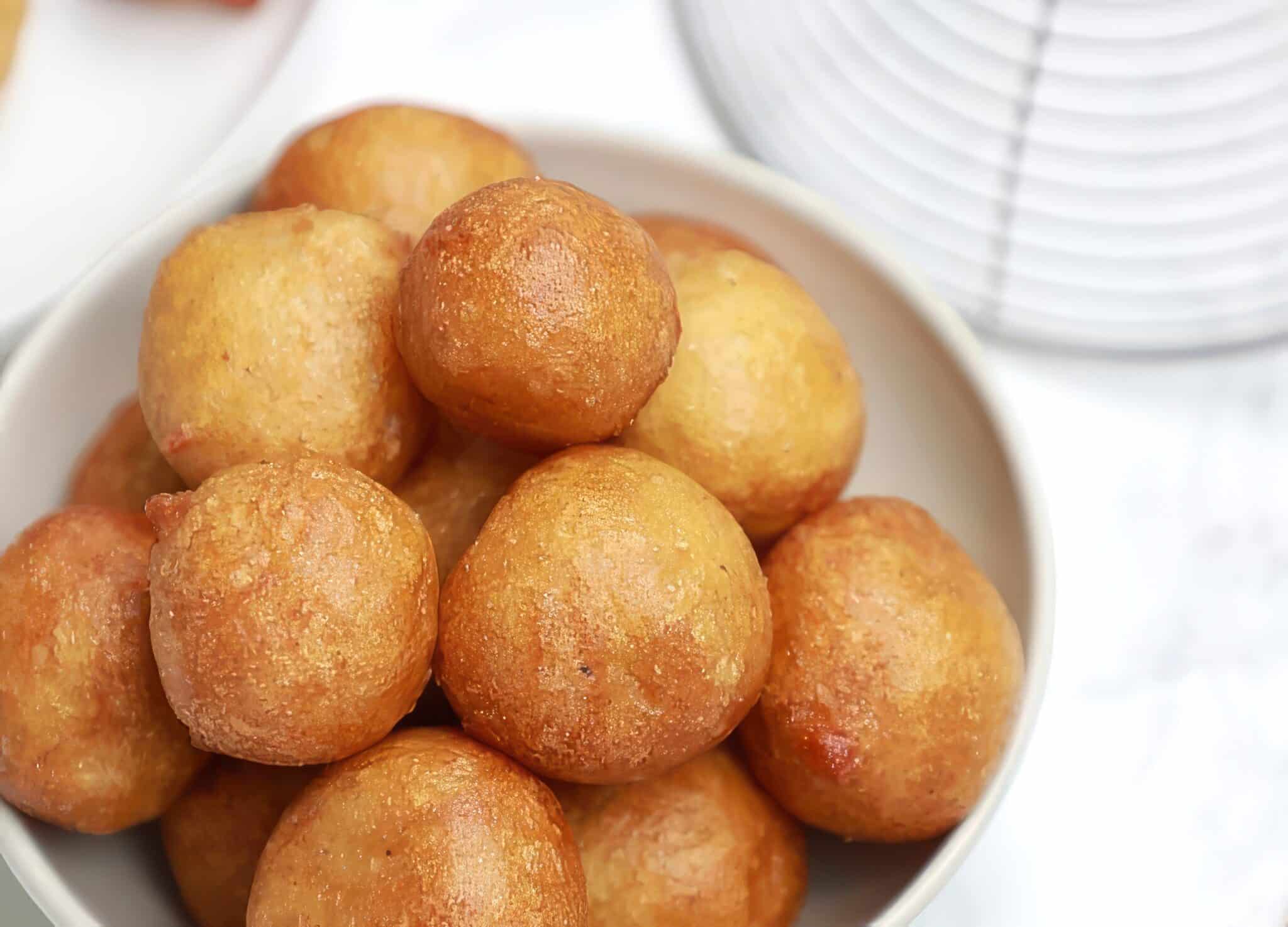
20. Chin Chin
Chin chin is a crunchy, deep-fried snack made from dough flavored with sugar, nutmeg, and occasionally milk. It’s a common sight at Nigerian celebrations, from weddings to birthdays, where it’s served alongside other snacks. Chin chin’s crispy texture and sweet flavor make it a favorite treat for both adults and children.
This snack has West African origins and can vary slightly depending on the recipe. Some versions are soft and slightly chewy, while others are more crisp and crunchy. Chin chin is also sold in stores and markets, often packaged for easy snacking.
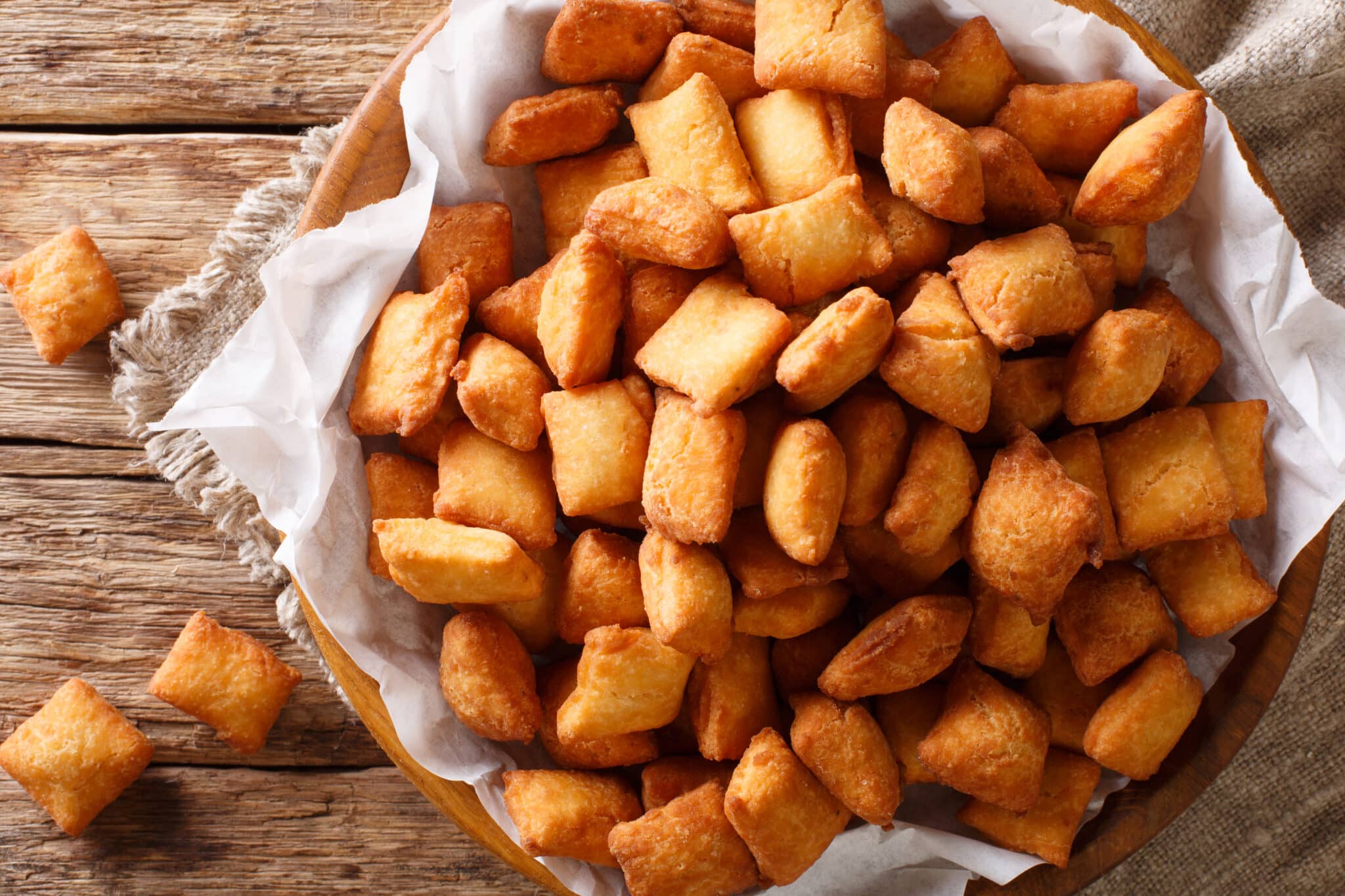
21. Zobo Drink
Zobo is a refreshing beverage made from dried hibiscus leaves. The drink, which has a tart, cranberry-like flavor, is often spiced with ginger, cloves, and sometimes pineapple juice for sweetness. Zobo is commonly served at parties, gatherings, and street stalls, and is enjoyed by people across Nigeria.
Zobo has its roots in West Africa, where hibiscus tea is a common drink. It’s known for its vibrant red color and is believed to have numerous health benefits, including being rich in antioxidants. In Nigerian homes, zobo is a popular alternative to sugary drinks, and it’s especially loved during hot weather. Try this zobo drink recipe.
Bring Nigerian dishes to your table
Nigeria boasts a rich history and a thriving food culture. If you want a taste of Nigeria at home, these traditional Nigerian dishes are an ideal starting place.
Nigerian street food culture
Lagos, Nigeria’s largest city, is renowned for its bustling street food scene. At any time of day, you’ll find vendors lining the streets, offering quick, delicious meals for passersby. From our list above, you’ll find iconic street foods. One is akara, the deep-fried bean cakes typically eaten as a breakfast item, paired with pap (a fermented corn pudding) or bread.
Another popular street food is puff puff, the soft and sweet dough balls often sold in large batches by street vendors.
In the evenings, street food offerings include heartier dishes like nkwobi stew and ewa agoyin. Both are staples for their intense flavors and widespread availability at street-side stalls.
Related: Check out our guide to Lagos street food for a deeper dive into the dishes you can’t miss.
Nigerian cuisine’s influence on neighboring African countries
Nigerian cuisine, particularly dishes like jollof rice, has sparked culinary rivalries across West Africa. Countries like Ghana, Senegal, and Sierra Leone have their own versions of jollof, each claiming to have the best recipe. The competition between Ghanaian jollof and Nigerian jollof is particularly famous, driving debates on social media and food festivals worldwide.
Beyond jollof, the influence of fufu and pepper soup extends across West African countries, with regional variations that reflect local ingredients. In Ghana, for example, fufu is typically made with plantains and cassava, while in Nigeria, it might include yams. Similarly, pepper soup has numerous versions across West Africa, sometimes made with goat, fish, or even offal, depending on the region.
Related: For more on jollof and its West African variations, including the “jollof wars,” read our article on the iconic dish.
